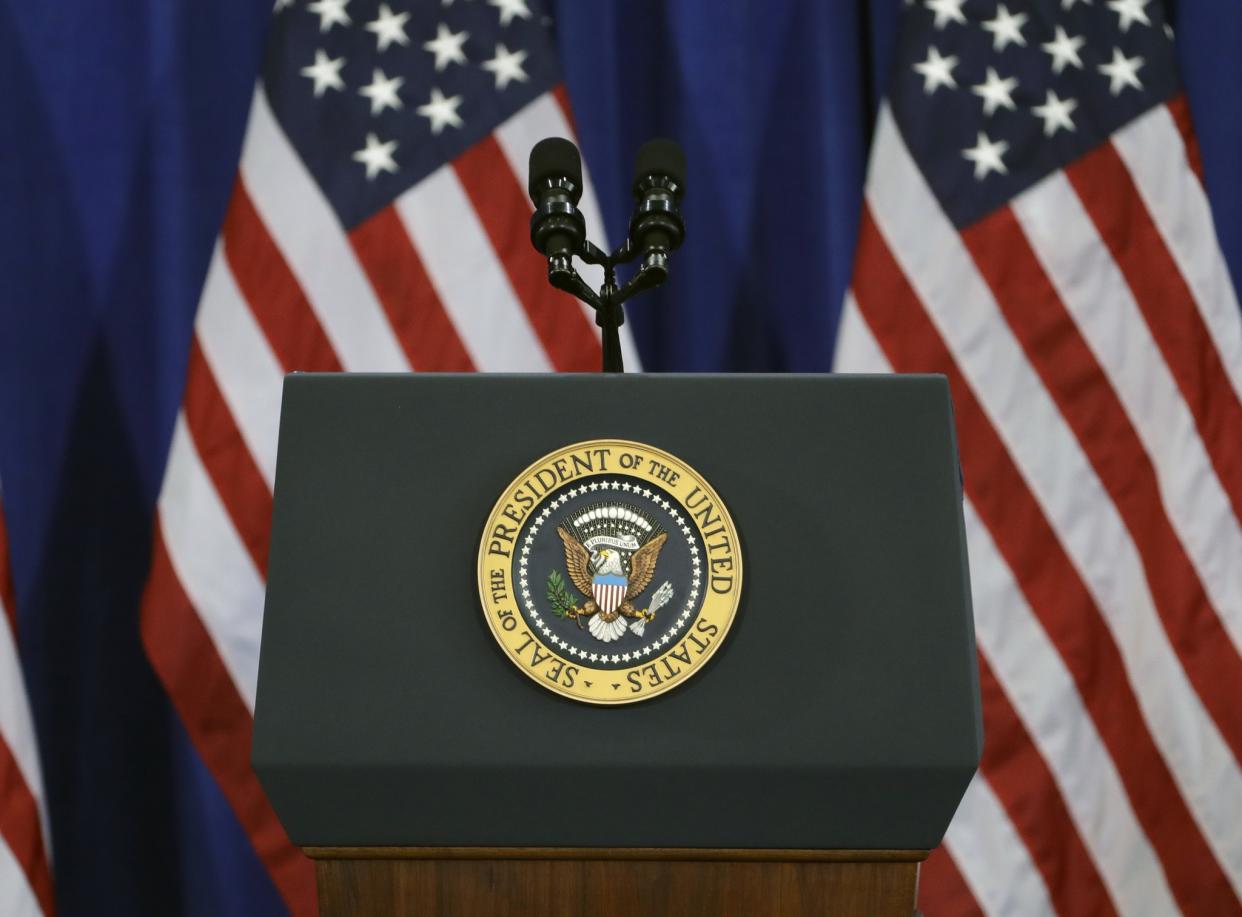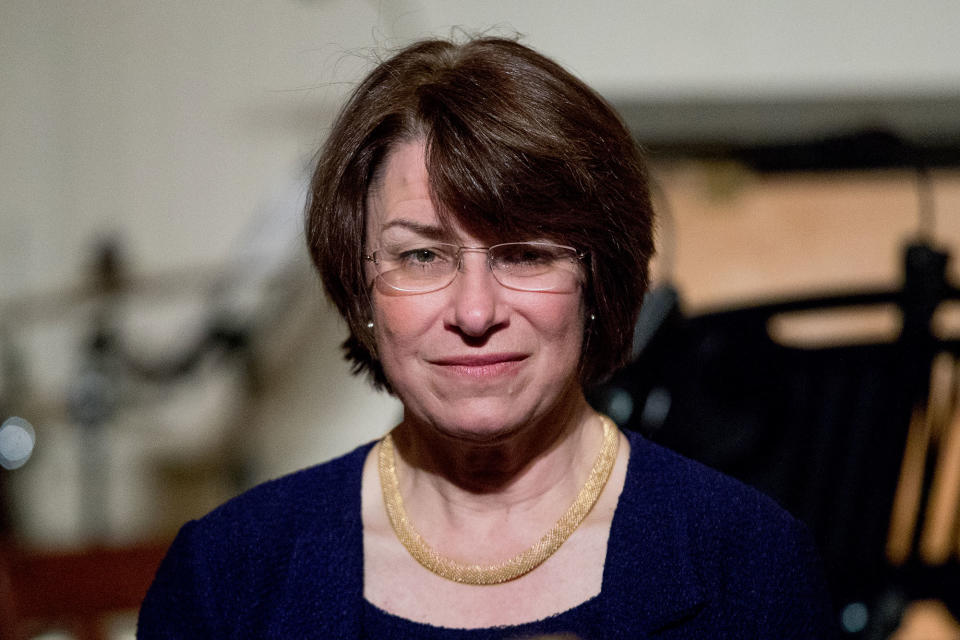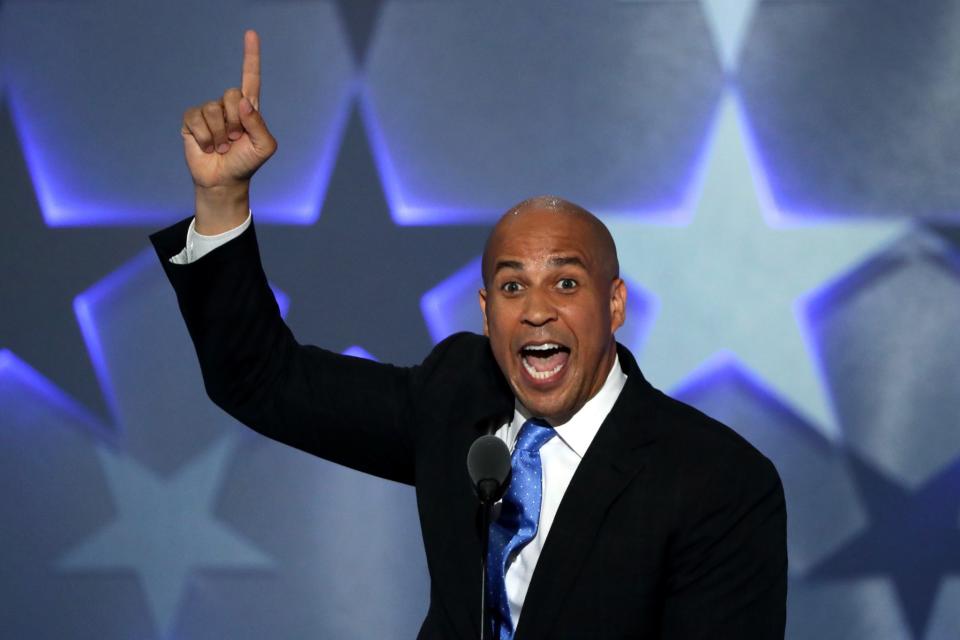Democrats are still looking for a 2020 leader. But they are starting to figure out their message.

The 2020 election is still 1,266 days away, but if you want to know what the Democrats challenging President Donald Trump will sound like — or at least what the Democrats currently thinking about challenging Trump might sound like — there was no better place to be than Tuesday’s 2017 Ideas Conference at the Center for American Progress in Washington, D.C.
The speaking roster for the daylong progressive gathering read like a who’s who of 2020 Democratic presidential wannabes: Sen. Cory Booker of New Jersey, Sen. Kirsten Gillibrand of New York, Sen. Kamala Harris of California, Sen. Amy Klobuchar of Minnesota, Sen. Elizabeth Warren of Massachusetts and Mayor Eric Garcetti of Los Angeles.
And none of them was shy about sketching out their vision of how Democrats can defeat Trump next time around.
“I have news for Donald Trump,” Warren said. “No matter how much he might admire Vladimir Putin’s Russia, here in America, we will never accept autocracy.”
In keeping with the event’s billing as both a celebration of the “spirit of resistance” and a forum for “ideas to move the country forward,” two big themes seemed to emerge over the course of the day. The first was negative: Trump has broken many of the campaign promises that helped persuade white working-class voters in key blue states to defect from the Democratic Party. The second was positive: Here are some promises that Democrats should make if they want to win those voters back.

The effect was like a preliminary pitch for a new platform of progressive wedge issues — complete with a new, post-Obama, post-Clinton class of Democratic prospects auditioning for the role for pitchman- or pitchwoman-in-chief.
Stylistically, the field — if you can call it a “field” yet — was fairly diverse. Klobuchar was folksy and informal. Garcetti was polished and cosmopolitan. Gillibrand was focused and direct. Harris was tough. Booker was impassioned. Warren was her usual fiery self.
Yet despite these differences of tone, each would-be candidate seemed to follow the same basic playbook when it came to Trump: Identify an area where he’s allegedly failing the working class, then propose an alternative approach and argue for its crossover appeal.
For Gillibrand, it was paid family leave. “Remember on the campaign trail, when Candidate Trump broke away from most of his party and announced that he supported paid leave?” she asked. “I do. And that would make sense, right? Because paid leave should not be a Republican or a Democratic issue. Paid leave rewards work and takes care of families — something we all agree on. But this was just another empty promise.”
Harris tackled criminal-justice reform, slamming the recent sentencing memo from Attorney General Jeff Sessions as a “reviv[al] of the war on drugs — the failed war on drugs.”
“Drug addiction touches every community and every family in our country,” Harris explained, noting the opioid epidemic in particular. “Conservatives like Sen. Rand Paul have advocated for a better approach to drug addiction. And 8 in 10 Americans who voted for Trump say criminal justice reform is important or very important to them. … There’s a real opportunity [here] to reach parts of America that feel overlooked and don’t realize how much they have in common with people who might look very different.”
Warren focused on government accountability, arguing that “concentrated money and concentrated power are corrupting our democracy — and becoming dangerously worse with Donald Trump in the White House.”

“We all remember Donald Trump’s promise during the campaign that he was going to ‘drain the swamp’ in Washington,” Warren said. “One hundred and seventeen days in, and the swamp is bigger, deeper, uglier and filled with more corrupt creatures than ever.”
Unlike her peers, Klobuchar didn’t deliver prepared remarks; she sat for a Q&A session instead. But she too accused Trump of betraying his working-class supporters, pointing out how his proposed budget would slash home-heating subsidies for lower-income Americans.
“I would say the whole budget — you have to look at it in terms of rural America,” Klobuchar said. “I think a lot of what we need to do in the Democratic Party is make sure we’re reaching out to people in every town. And not just [saying,] ‘Oh, you don’t win those counties or regions so we don’t go there.’ That was a bit of what we learned from the presidential race.”
Indeed, much of the program seemed like an implicit rebuke of Hillary Clinton’s 2016 campaign, with its narrow geographic focus and incessant anti-Trump messaging. To win in 2020, the participants argued, Democrats can’t afford to “have this party defined by who or what we are against,” as Booker put it, but rather “by the dream of America for all Americans.”
Garcetti and Booker — who opened and closed the conference, respectively — were more expansive than the rest of the speakers, with Garcetti making the case for cities as centers of progress at a time of Washington gridlock and Booker calling on today’s left-wing “resistance” to follow in the footsteps of earlier American movements for abolition, women’s suffrage and civil rights.

And yet, like the Democrats who followed and preceded them on stage, the Californian and New Jerseyan also portrayed Trump as a phony who “literally tells his supporters one thing, and then gets into the White House and does things that are 100 percent contrary to what he said and what he promised” (Booker) — while arguing that Democrats can reconnect with swing voters by delivering results where Trump has fallen short. (Garcetti pointed to L.A.’s massive new infrastructure projects as an example.)
“My friends, our country is at a transformational moment that has brought with it challenges and opportunities unlike anything we’ve ever faced,” Garcetti said near the end of his remarks. “The future is here — and the American people are waiting for someone to step up, to lead us with the confidence and courage we need.”
Whether any of the ambitious Democrats who flocked to the Center for American Progress Ideas Conference Tuesday will wind up being that leader remains to be seen; 2020 is still a long, long way off. But even at this early stage, the party’s most promising White House contenders are already homing in on a message — Trump didn’t deliver for the working class, white or otherwise; here’s how we will — that could sustain and unite them in the battles ahead.





